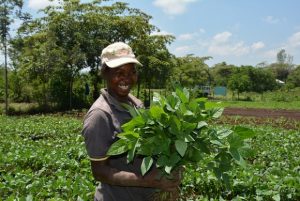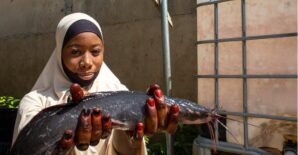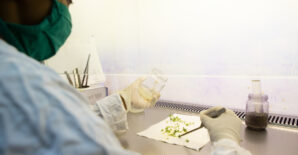 Today, over 60% of Africa’s 1.2 billion population is under the age of 35. Each year, an estimated 30 million young people join the employment market. The continent’s urban labour markets are buckling under the pressure of youth migrating from rural areas into the cities. Many of these young people are moving away from a life in the agriculture, which they perceive as outdated, unprofitable and hard work. However, this is not always the case and it is critical that governments develop and invest in strategies to attract and support the bulging youth demographic to seize the opportunities in agriculture.
Today, over 60% of Africa’s 1.2 billion population is under the age of 35. Each year, an estimated 30 million young people join the employment market. The continent’s urban labour markets are buckling under the pressure of youth migrating from rural areas into the cities. Many of these young people are moving away from a life in the agriculture, which they perceive as outdated, unprofitable and hard work. However, this is not always the case and it is critical that governments develop and invest in strategies to attract and support the bulging youth demographic to seize the opportunities in agriculture.
“All African governments, and the private sector, need to look at incentives to attract young people to agriculture and invest in creating or widening entry points for them to join the sector,” states Debisi Araba, CIAT’s Africa Director and member of the Malabo Montpellier Panel. One way to do this is through mechanization, which was highlighted at the recent All-Party Parliamentary Group (APPG) meeting on 12th September in London, focused on the theme of ‘Transforming Africa's agricultural value chains through mechanization’. Debisi Araba was joined on the APPG panel by Simon Winter, Executive Director of Syngenta Foundation and Iris Krebber, Head of Agriculture at the UK Department for International Development, who unanimously agreed on the potential of mechanization to stimulate new opportunities for youth across agricultural value chains.
 © Georgina Smith/CIAT
© Georgina Smith/CIAT
The emergence of new enterprises
Introducing on and off-farm processing technologies, solar-powered irrigation or off-grid cold storage facilities, for instance, creates new job prospects for young people. The founders of Hello Tractor, Van Jones, Jehiel Oliver and Martha Haile, have successfully tapped into the opportunities offered by mechanization in Africa’s agricultural sector. The company uses mobile technology to improve the accessibility of tractors for smallholder farmers by connecting them with local tractor owners from whom they can hire machines at an affordable price. To increase transparency and allow the owners to keep track of their tractors via an app, Hello Tractor has created monitoring devices designed to fit any brand of tractor. The devices use GPRS and SMS to transmit data and provide 24-hour visibility of tractor assets in the field. As Simon Winter explained at the APPG, “Hello Tractor are providing a very important technology platform to increase the efficiency and use of machines” by offering a win-win solution for both farmers and tractor owners.
Debisi Araba highlighted the success of another young Nigerian start-up, ColdHubs, which has set up solar-powered refrigeration units in markets and on farms that allow farmers, wholesalers and retailers to preserve, store and transport their products more easily. The cold stations have increased farmers’ incomes by up to 25% by extending the freshness of perishable food from 2-21 days. Both ColdHubs and Hello Tractor are promising examples of opportunities for youth to develop technology-driven services in agriculture, as well as the potential for mechanization to make agriculture a more profitable and attractive sector to work in.
Addressing the skills gap among Africa’s youth
However, to benefit from the opportunities offered by mechanization, young people must first have the skills and training to operate, maintain and repair machinery both on and off-farm. Additionally, the demand for a sustainable and affordable services sector to support development and maintenance of these new technologies must not be overlooked. While this opens up more entry points for youth employment, the majority of young people joining the labour market in Africa do not have the necessary skills to provide these services. The Malabo Montpellier Panel’s report, Mechanized: Transforming Africa’s Agricultural Value Chains, emphasizes the need to fill this skills gap and stresses that, “The mainstreaming of formal vocational training is needed to turn young people and farmers in the food system into skilled entrepreneurs who can run their farms or businesses as economical, productive, sustainable enterprises.”
In Morocco, a network of 52 institutions with 24 different curricula has been set up across the country to improve the uptake and efficiency of agribusinesses. The country also has 30 middle schools in rural areas dedicated to training young people in agricultural technology. More educational programmes like these need to be introduced across the continent to provide young people with the knowledge and training they need to transform agriculture. As Iris Krebber rightly declared, “We don’t just need to look at demand for mechanization and willingness of the private sector to invest in new technologies, we need to have conversations with governments” to encourage them to create an environment in which youth can thrive and drive agricultural mechanization. Read original blog posted on mamopanel website



